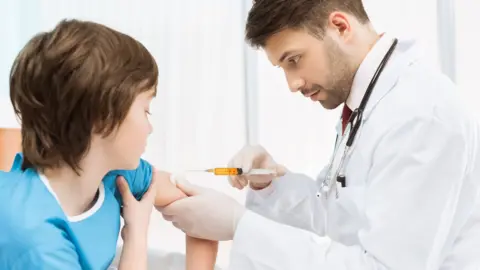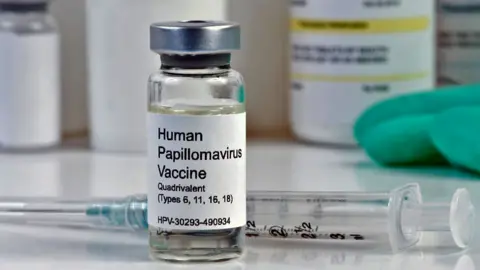HPV vaccine for boys could cut cancer rates, research suggests
 Getty Images
Getty ImagesVaccinating schoolboys against human papillomavirus (HPV) may cut rates of cancers related to the virus in the long term, new research suggests.
HPV is a sexually-transmitted infection and some types are linked to cancer.
Vaccination of girls has already been credited with reducing cervical cancer in women, but researchers believe cancers among men may also fall.
A two-year study of 235 patients in Scotland with head and neck cancer found HPV was present in 60% of cases.
A report in April said a vaccine for girls had nearly wiped out cases of cervical pre-cancer since an immunisation programme was introduced 10 years ago.
Over the last decade, schoolgirls across the UK have routinely received the HPV vaccine when they are 12 or 13. The uptake of the girls' vaccine in Scotland is about 90%.
The new report's co-author Kevin Pollock, of Glasgow Caledonian University, said extending the vaccination to boys could help reduce rates of head and neck cancer which has been increasing over the last 25 years, particularly among men.
In 1994, there were 100 cases in Scotland, but by 2015 this had more than tripled to 350.
Dr Pollock said alcohol and smoking had been linked to these cancers but added that a change in sexual behaviour could also have had an impact.

What is HPV?
 Alamy
Alamy- HPV is the name given to a common group of viruses - there are more than 100 types
- It is usually sexually transmitted, but it can also be transmitted by any skin-to-skin contact in the genital and oral areas
- Cancers that can affect men, such as cancer of the anus, penis, head and neck, are linked to infection with HPV types 16 and 18
- HPV types 6 and 11 are responsible for the majority of genital wart infections
- Vaccinating girls indirectly helps protect boys against these types of cancer and genital warts
- The number of genital wart infections in the UK has already fallen in both girls and boys because of the girls' vaccination programme
Source - NHS

He welcomed Scottish government plans to extend the school HPV vaccination programme to cover boys as well as girls.
"Our latest data shows that 78% of people with head and neck cancers were men and that HPV was present in 60% of the cancers," he said.
"This means the vaccine may reduce some of these cancers in the long term in Scotland.
"Not only that, but when we looked at the deprivation status of these cases - much like cervical cancer - head and neck cancers are disproportionately experienced by more deprived individuals."
'End the destructive impacts'
The findings follow April's report from Dr Pollock and academics from Strathclyde, Aberdeen and Edinburgh universities, which suggested routine vaccination of schoolgirls in Scotland with HPV had led to a dramatic reduction in cervical disease in later life.
Since a UK-wide immunisation scheme for girls aged 12 and 13 was introduced a decade ago, researchers found a reduction of up to 90% of instances of pre-cancerous cells being discovered at smear tests among women aged 20.
Throat Cancer Foundation chief executive Jamie Rae welcomed the latest research.
The Falkirk businessman, who set up the charity after being diagnosed with oropharyngeal cancer caused by HPV, said: "HPV is responsible globally for 5% of all cancers.
"What Dr Kevin Pollock's research highlights is both the importance and opportunity to end the destructive impacts HPV has on head and neck cancers.
"We welcome the findings in this research and recognise that it is going to be a useful tool to help educate the general public as to why a nationwide HPV vaccination programme will benefit and protect children's health in future years."
The Cancer Research UK-funded study involved experts from Glasgow Caledonian University (GCU), Glasgow and Strathclyde universities and NHS Greater Glasgow and Clyde. It was led by an oncologist at Sussex Cancer Centre and was published in the Elsevier Clinical Oncology Journal.
